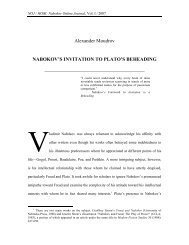domesticated translation: the case of nabokov's translation of alice's
domesticated translation: the case of nabokov's translation of alice's
domesticated translation: the case of nabokov's translation of alice's
Create successful ePaper yourself
Turn your PDF publications into a flip-book with our unique Google optimized e-Paper software.
NOJ / НОЖ: Nabokov Online Journal, Vol. II / 2008<br />
Nabokov’s approximation <strong>of</strong> <strong>the</strong> effect <strong>of</strong> English puns is thoroughly explained<br />
by Demurova and Connolly; I am going to have a look only at examples not mentioned in<br />
<strong>the</strong>ir papers.<br />
Nabokov was successful in translating <strong>the</strong> English puns based on homonyms. For<br />
instance, <strong>the</strong> pun in <strong>the</strong> conversation between Alice and <strong>the</strong> Cheshire Cat which sounds<br />
like “pig or fig” is translated as “porosenok ili openok” (“pig or honey agaric”).<br />
Sometimes Nabokov even invents his own homophones: when <strong>the</strong> White Rabbit talks to<br />
Alice about <strong>the</strong> imprisonment <strong>of</strong> <strong>the</strong> Duchess, Alice asks for what “shalost’” (“prank”)<br />
she was punished. The White Rabbit thinks that she said “zhalost’” (“pity”) and wonders<br />
why she is so sorry about <strong>the</strong> Duchess.<br />
Ano<strong>the</strong>r substitution <strong>of</strong> a homonym can be found in <strong>the</strong> chapter “Who stole <strong>the</strong><br />
Tarts.” When <strong>the</strong> Hatter testifies, he starts by mentioning <strong>the</strong> twinkling <strong>of</strong> <strong>the</strong> tea. The<br />
King angrily asks him: “The twinkling <strong>of</strong> <strong>the</strong> what?” and <strong>the</strong> Hatter replies that “it began<br />
with <strong>the</strong> tea.” The King becomes furious and exclaims: “Of course twinkling begins with<br />
a T!” mistaking <strong>the</strong> time <strong>of</strong> <strong>the</strong> event for <strong>the</strong> first letter <strong>of</strong> <strong>the</strong> word. Unable to duplicate<br />
this pun, Nabokov invents a different kind <strong>of</strong> misunderstanding on <strong>the</strong> part <strong>of</strong> <strong>the</strong> king.<br />
The Hatter mentions that when he started drinking tea he suddenly felt “syro” (“wet”) in<br />
his head, but <strong>the</strong> King thinks that he says “syr” (“cheese”) and angrily notes that <strong>the</strong><br />
cheese is absolutely unnecessary.<br />
Nabokov also translated <strong>the</strong> pun occuring in <strong>the</strong> conversation between Iashka and<br />
<strong>the</strong> White Rabbit. Iashka explains that he digs “for apples,” thinking that apples grow in
















